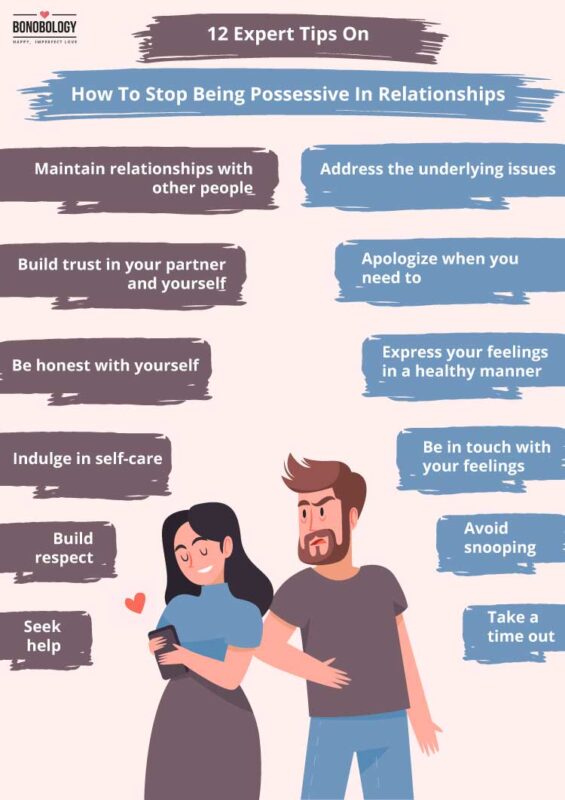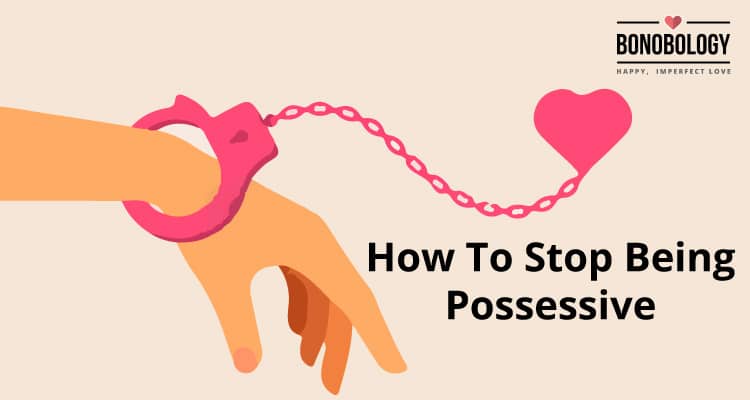Do you find it hard to trust your partner, are jealous most of the time, and feel the need to snoop? You’re likely being possessive in your relationship. It’s imperative then to learn how to stop being possessive since it only hurts your relationship and makes it fragile. Your feelings of insecurity and mistrust triggering this possessiveness could be stemming from past experiences, including relationship history and how those relationships unfolded.
In this article, trauma-informed counseling psychologist Anushtha Mishra (M.Sc. in Counseling Psychology), who specializes in providing therapy for concerns such as trauma, relationship issues, depression, anxiety, grief, and loneliness among others, writes to help us understand what being possessive means, how it affects relationships, along with some tips on how to not be possessive.
What Is Possessiveness?
Table of Contents
Possessiveness, in its extreme form, is demanding someone’s total attention and love. When there’s a need for someone’s undivided endearment all for yourself, it can lead to stalking, feelings of jealousy, and even abuse or paranoia. If there is possessiveness in a relationship, your partner’s attention on someone or something else can set you off.
At the heart of being controlling and possessive is the innate fear of loss. People who display excessive possessiveness behaviors worry that their partner might leave them at any given point in their relationship. This leads to feelings of anger, sadness, and fear. Individuals with separation anxiety often experience heightened levels of possessiveness as well. This is typically what we call a possessive relationship style.
In summary, possessiveness in a relationship is a result of the following factors:
- Fear of losing someone we love
- Insecurities we harbor deep inside
- An anxious attachment style
- Separation anxiety
- An inadequate sense of self-worth
How Does Possessiveness Manifest In Relationships?
Deep insecurities are often the root of possessiveness, which manifests itself through insecure attachment styles. People with an anxious attachment style often have a negative view of themselves owing to poor self-esteem. They then tend to project it onto their partners by not being able to trust them.
Individuals with an insecure attachment style fear that they are not good enough for their partners and therefore have a deep fear of rejection. This, then, leads to their controlling behavior, which is their way of trying to keep their partner from leaving. This is also true when you are being possessive in a long-distance relationship.
A Reddit user who had a similar experience says, “I’ve been with my current fiancé for five years and honestly the first year I was constantly internally insecure about the relationship because I truly thought she was too good for me, and even though she gave no indication that she would be unfaithful I was just incredibly insecure.”
All these mechanisms are mostly unconscious and happen without realization. There tends to be low awareness of these patterns since this is how the person displaying them views the world. Possessiveness is rather a symptom of a much bigger condition. It is usually used as a coping mechanism for anxiety or fear of being abandoned.
Some early signs of possessiveness to look out for in yourself or your partner are,
- You’re moving too fast in your relationship
- You can’t help but keep texting your partner, asking about their whereabouts
- You tend to feel upset when your partner meets other people without you
- You often find yourself being snoopy without any regard for their privacy because of your lack of trust
- You experience jealousy way too often
- You have unrealistic expectations of your partner and your relationship
- You never make plans of just your own and get upset when your partner does
We all experience a hint of possessive love in our relationships, especially in romantic relationships. The need and desire to call our partners our own is considered the soul of a relationship. But possessiveness in extreme can be the exact opposite of love. Love, after all, sets you free. Possessiveness in extreme clips the wings. Therefore, we must learn how to manage feelings of possessiveness so that the relationship remains strong and does not fall prey to the fragility possessive behavior can bring with it.
.
12 Expert Tips On How To Stop Being Possessive In Relationships
Now that we realize that excessive possessiveness can be harmful to a relationship. Let’s look at how to stop being possessive. The same Reddit user gives us insight on how to change possessive behavior when they say, “Learn to trust your partner over time and become more secure in the relationship knowing your thinking is the problem, not your partner’s actions.” This is what differentiates a secure connection from a possessive relationship style.
An excess of possessive love can cause a lot of agony in a relationship, and therefore, learning how to control the impulse to be snoopy is important. Below are a few ways that can help in minimizing this urge for you or your partner and reduce possessiveness in love:
Related Reading: 13 Warning Signs Of Being Obsessed With Someone
1. Take a deep breath and take a time out
In his article on overcoming jealousy and possessiveness in Psychology Today, Leahy (Ph.D.) says taking time out to evaluate yourself whenever you find yourself becoming possessive is a helpful coping technique. This break will give you time to breathe and think about what you are feeling and what your actions and their consequences can be. This also applies to situations when you are being possessive over an ex.
Maybe try using this time to ask yourself what about this situation is making you feel possessive. Become aware of your feelings and name them in this short time out and only once you’ve thought about all of these factors, go back and communicate them to your partner.
2. Avoid snooping or situations that lead to unjustified suspicions
Avoid situations that are likely to make you feel unjustified suspicions and leave you Jealous, being controlling, and possessive. You are more likely to have suspicious thoughts when you are in a vulnerable state, isolated, or in a stressful situation. This can lead you to feel negative about yourself and everything around you. Be mindful of this since your suspicious thoughts can also turn into paranoia. A few signs to catch on feelings of suspiciousness are:
- Being defensive or aggressive
- Getting easily offended
- Having trouble relaxing or letting your walls down
3. Be in touch with your feelings
If you’re not in touch with your feelings and there’s no emotional attunement, they can show up in various ways. It can also manifest in you projecting your feeling toward your partner, which can come across as excessive possessive behavior. If your relationship is growing weary, it is a good time to sit down and be mindful of what and how you are feeling.
You can see tremendous improvement in your relationship by identifying and working on the root causes of your difficult emotions. You might be then able to overcome the need to control your partner to feel like you’re in control.
4. Express your feelings in a healthy manner
Research has shown that being able to express your emotions can lead to positive outcomes such as increased adjustment and also psychological resilience. This can help you lower your need for control and can improve your relationship with your significant other. Different ways in which you can healthily express your feelings are:
- Using positive self-talk
- Being a good listener
- Teaching yourself ‘feeling words’
- Practicing acceptance

5. Apologize when you need to
This is a very important tip to keep in mind when exploring how to change possessive behavior. Knowing when to apologize is as important as knowing how to apologize. It’s a good idea to clear the air if you feel you did something wrong or something that might have hurt the other person, be it accidentally or purposefully. It’s important to note that you take responsibility and own up to YOUR part of the situation and not theirs. You can do so by,
- Taking responsibility
- Expressing your regrets
- Making amends
- Reaffirming your boundaries
- Apologizing for the right reasons
Related Reading: 9 Sincere Ways To Apologize To Someone You Hurt
6. Address the underlying issues in your relationship
Remember, the behavior of possessiveness is not a condition, it is a symptom. Maybe your expectations don’t match, the communication pattern is flawed, or there’s a lack of support in the relationship. It is, therefore, important to understand where jealousy and possessiveness in relationships stem from.
Analyze the underlying causes and address them together as a couple. Communicate honestly and openly with your partner. This can take the relationship a long way. This is not just specific to how to stop being possessive but applies to every aspect of a relationship.
7. Maintain relationships with other people as well
When you invest all your energy into the relationship and rely on your partner for all your needs, jealousy and possessiveness can get triggered when they spend even a little bit of time with other people. One way to address this is by making it a point to not rely on one person for all your social and personal needs. This also helps with loneliness in a relationship.
Increase your social circle so that when your boo is busy with something else or has to be with someone else, you can have your people to talk to or meet. Build your support system in a way that the pressure of fulfilling all your needs doesn’t fall on one single person.
8. Build trust in your partner and yourself
As we discussed, the deeper issue when it comes to possessiveness is a lack of trust. Therefore, learning to trust in a relationship is essential to counter this tendency. This does not just mean trusting your partner but also trusting yourself.
Believe in your partner and in their capacity in making the relationship work. Believe in yourself as well and embrace the fact that you are in this relationship because your SO saw you for you and chose you.
9. Be honest with yourself
You accept your weaknesses and flaws when you are honest with yourself. The more aware you are of what you are or aren’t capable of, the more confident in yourself you can be. This makes it one of the most important tips on how to not be possessive.
When you honestly accept that you are being possessive, there will be room to manage the feeling and eventually put a full stop to it. If you lie to yourself and are dishonest, the chances of you modifying this behavior diminish.

10. Build respect in your relationship
Respect is reflected in how you treat one another daily. Even when you disagree, you can respect, acknowledge and value each other’s opinions and feelings by fighting the right way. It isn’t about controlling or making your partner do what you want them to do. It is about the freedom to be yourself and to be loved for that. Some of the ways you can practice respect in a relationship are:
- Talking openly and honestly with each other
- Listening to each other
- Valuing each other’s feelings and needs
- Compromising the right way
- Speaking kindly to and about each other
- Giving each other space
- Supporting each other’s interests, hobbies, careers, etc.
- Honoring each other’s boundaries
Related Reading: 9 Examples Of Mutual Respect In A Relationship
11. Indulge in self-care
When you put a hold on things that make you feel drained and instead do things that make you feel mentally and physically well, you start to value your self-worth. Self-care is important for maintaining a healthy relationship with both yourself and your partner. It produces positive feelings and helps boost self-love, self-confidence, and self-esteem. Since feeling possessive is linked with low self-esteem, it can also help you deal with this tendency.

12. Seek a therapist’s help with feelings of insecurity
Seeking help from a mental health professional can be an excellent way to navigate how to stop being possessive in a relationship. They would help you figure out what might be making you feel this way and also how to manage these feelings of insecurity.
With the help of Bonobology’s panel of experienced therapists, you can move one step closer to a harmonious relationship.
Key Pointers
- Possessiveness in the extreme is demanding someone’s total attention and love
- Deep insecurities and insecure attachment styles are often at the root of possessiveness
- Being excessively jealous or not being able to deal with your partner paying attention to someone/something else are among the classics signs of being possessive in a relationship
- Taking time outs, avoiding snooping, being in touch and being honest about your feelings, building respect and trust, engaging in healthy communication, and seeking professional help are a few ways how to not be possessive in a relationship
Feeling possessive all the time is exhausting for both your partner and yourself and can bring toxicity to a happy relationship. Feelings of possessiveness come from a place of insecurity and through the ways we discussed above, I hope you have some idea of where you start your journey of healing the relationship. Protect your relationship with these expert-backed suggestions on how to stop being possessive and build a strong foundation for your relationship.
Your contribution does not constitute a charitable donation. It will allow Bonobology to continue bringing you new and up-to-date information in our pursuit of helping anyone in the world to learn how to do anything.
Ask Our Expert
You must be Logged in to ask a question.



Featured
My Girlfriend Rejected My Proposal: What Should I Do?
When And How To Ask For A Second Date
How To Get Over Infatuation: 17 Psychological Tricks
How To Talk Intimately With Your Boyfriend Over Text—15 Easy Ways
13 Red Flags When Dating An Older Man | Don’t Ignore These
100 Best Hinge Prompts With Answers For Instant Connections
What Does Taking A Break Mean To A Guy And How To Deal With It
Bumble Compliments: How To Use And What To Write
7 Early Signs Of A Highly Compatible Relationship
What Is A Soft Launch Relationship? All You Need To Know
35 Relationship Emojis — Creative Ways To Communicate With Boo
How To Make The Most Of A Date With A Chinese Woman When You Don’t Speak Her Language
Millennial Dating: Decoding The Generation’s Struggle With Love And Relationships
11 Sweet Things To Do In A Long-Distance Relationship
11 Ways Of Flirting With Older Women | Keep It Classy
11 Perks Of Dating A Tomboy And How To Make It Work
100 Physics Pickup Lines Only The Sharp-Minded Will Get
How To End A Situationship: 11 Expert Tips
15 Situationship Rules You Must Follow To Protect Yourself
125 Rapid Fire Questions For Couples